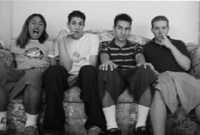Out where Route 66 and the Santa Fe Trail converge, 50 miles East of Los Angeles, in a suburb called Rancho Cucamonga come four musicians collectively named Rufio. It’s a punk rock cliché: suburban youth pick up instruments and play music together out of frustration, boredom or anger. Rufio’s story is similar enough. Scott and Clark grew up in the same neighborhood, attending grade school together. In high school Scott hooked up with bassist Jon Berry, played in several bands together, and eventually bought a 4-track and started writing and recording songs. “We gave the tapes to Mike and asked him to play drums, and then Clark joined. It was cool,” says Berry.
It was cool. This simple statement speaks volumes about the band and its attitude. And it’s where the cliché breaks down. The members of Rufio aren’t angry at the world or frustrated with life; they’ve come together for the sheer enjoyment of playing music with friends and sharing their songs with the public at large. Of course, the side effect of curing a touch of suburban torpor doesn’t suck.
Coming of age during the information age certainly didn’t hinder their efforts of self-promotion. Members of Rufio immediately shared their songs with friends and acquaintances in chat rooms they were known to frequent. Turns out Rufio’s infectious. The virus spread. Fast. You’ve heard of this phenomenon before: fan-building through file-sharing.
Rufio quickly built a loyal West Coast following and after signing to Nitro Records hit the road with the likes of Strung Out, Taking Back Sunday and The Ataris. To everyone’s surprise, including the band itself, Rufio was regularly selling out of merchandise, and it wasn’t uncommon for them to outsell the headlining band. It was clear their loyal following wasn’t limited to the West Coast. Rufio found ardent fans just about everywhere.
“The best part about touring is meeting new people, in a city where you’ve never been, and they come up and tell you how much they relate to your songs. It’s an amazing experience,” says Sellers. Such strong response guaranteed Rufio more touring opportunities and gave the band more reason to stay on the road.
The seeds of MCMLXXXV “1985” were planted with the same youthful exuberance, as their debut, Perhaps, I Suppose. Songs sprouted from garage sessions, the four friends hashing together guitar riffs, inspired by their favorite ‘80’s metal bands, bass lines and drumming mayhem. Considering their youthful years, the fact that most of the songs on their debut were about girls surprised no one. This time around for MCMLXXXV, Rufio developed the songs over a longer period of time. The band wrote and recorded demo versions of a large portion of the songs before beginning a frenetic touring schedule. Constant practicing and three back-to-back national tours allowed the band to “jam” the songs, shaping and reworking each track, throwing out parts that just didn’t fit, leaving less to chance.
The missing ingredient? An outside influence. Someone to add finishing touches. Enter Nick Rasculinecz. Between sessions with Foo Fighters and Rancid, Rasculinecz heard their demos and promptly offered his services. The two parties immediately hit it off and went to work. “Nick was another set of ears. A set of very experienced ears. He pointed out things we would have never heard or thought of. He’d throw out complete choruses and get us to create brand new ones,” Sellers remembers. “He really helped us structure our songs.”
Ask Rufio what bands enjoyed rotation during the recording sessions and the playlist will look something like this: Rush, Ben Folds Five, Sigur Ros, Soilwork, The Beatles, Coldplay, and In Flames. If a couple of those bands don’t ring a bell then a brush up on the Swedish Metal scene wouldn’t hurt. “We grew up on the punk scene, but we listen to so much more than that now,” says Berry of their listening habits.
Lyrically, Rufio’s songs continue to mirror the struggles many of their generation face. Whether they address the bombardment of images and messages propagating our culture’s impossible standard of beauty as in “Science Fiction,” or being unable, or unwilling to leave the nest and break free from parental influence on “Control,” Rufio uncannily taps into the life experiences of their fans. And it’s all with a positive spin. “Many of my friends get bogged down and depressed with life, and they can’t seem to see beyond that. ‘White Lights’ is me reaching out to them, pointing out that they have plenty to live for.”
What’s the story behind the album title MCMLXXXV? Was the band all born that year? Was 1985 the year they were conceived at their parent’s prom? “Somebody had to pick up where Van Halen left off,” says Berry. Figures. Rufio has never been known to take themselves too seriously.
From here Rufio is back on the road supporting bands they grew up listening to, bouncing off the walls, literally, night after night. After a round of Warped Tour dates on the West Coast this summer, the band plan to take to the road yet again, this time headlining. Either way, each set will affirm the band’s partiality to touring and meeting fans: Scott grinning ear-to-ear, belting through their set, Jon and Clark frantically trading places, spinning across the stage, just avoiding seemingly certain collisions, and Mike drumming as if he drummed hard and fast enough he could reverse the world’s rotation and save Lois Lane. Afterwards you’ll find the band milling about their merch booth and overhear the exchange of cell phone numbers and email addresses among the band and their fans, making new friends. That’s the thing. Rufio’s fans are their friends. All Rufio wants is to befriend the world and show them a good time.
Source: http://www.themilitiagroup.com
